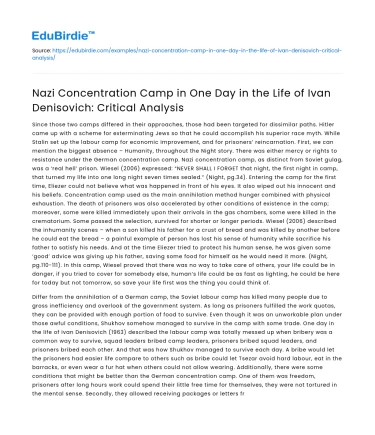Since those two camps differed in their approaches, those had been targeted for dissimilar paths. Hitler came up with a scheme for exterminating Jews so that he could accomplish his superior race myth. While Stalin set up the labour camp for economic improvement, and for prisoners’ reincarnation. First, we can mention the biggest absence – Humanity, throughout the Night story. There was either mercy or rights to resistance under the German concentration camp. Nazi concentration camp, as distinct from Soviet gulag, was a ‘real hell’ prison. Wiesel (2006) expressed: “NEVER SHALL I FORGET that night, the first night in camp, that turned my life into one long night seven times sealed.” (Night, pg.34). Entering the camp for the first time, Eliezer could not believe what was happened in front of his eyes. It also wiped out his innocent and his beliefs. Concentration camp used as the main annihilation method hunger combined with physical exhaustion. The death of prisoners was also accelerated by other conditions of existence in the camp; moreover, some were killed immediately upon their arrivals in the gas chambers, some were killed in the crematorium. Some passed the selection, survived for shorter or longer periods. Wiesel (2006) described the inhumanity scenes – when a son killed his father for a crust of bread and was killed by another before he could eat the bread – a painful example of person has lost his sense of humanity while sacrifice his father to satisfy his needs. And at the time Eliezer tried to protect his human sense, he was given some ‘good’ advice was giving up his father, saving some food for himself as he would need it more. (Night, pg.110-111). In this camp, Wiesel proved that there was no way to take care of others, your life could be in danger, if you tried to cover for somebody else, human’s life could be as fast as lighting, he could be here for today but not tomorrow, so save your life first was the thing you could think of.
Differ from the annihilation of a German camp, the Soviet labour camp has killed many people due to gross inefficiency and overlook of the government system. As long as prisoners fulfilled the work quotas, they can be provided with enough portion of food to survive. Even though it was an unworkable plan under those awful conditions, Shukhov somehow managed to survive in the camp with some trade. One day in the life of Ivan Denisovich (1963) described the labour camp was totally messed up when bribery was a common way to survive, squad leaders bribed camp leaders, prisoners bribed squad leaders, and prisoners bribed each other. And that was how Shukhov managed to survive each day. A bribe would let the prisoners had easier life compare to others such as bribe could let Tsezar avoid hard labour, eat in the barracks, or even wear a fur hat when others could not allow wearing. Additionally, there were some conditions that might be better than the German concentration camp. One of them was freedom, prisoners after long hours work could spend their little free time for themselves, they were not tortured in the mental sense. Secondly, they allowed receiving packages or letters from relatives to make their life in camp less starved. As Solzhenitsyn (1963) mentioned Shokhov was an intelligent man that knew his sewing skill could able to make a trade with others. He lent his penknife to Tsezar might be a friendly gesture, but it's mean at the same time Tsezar owned his debt. It was also clear that in the miserable place, brotherhood existed between fellow prisoners in the same squad. Throughout the story, Shukhov behaved friendly to other prisoners, he might help a prisoner if that prisoner was in trouble, but it was only limited to whom he knew well. This behaviour supported the squad’s cohesion and raised the possibility rate of survival in the camp. Again, following orders and fulfilling the work quota, no matter the way of lying, prisoners would maintain his life.
Save your time!
We can take care of your essay
- Proper editing and formatting
- Free revision, title page, and bibliography
- Flexible prices and money-back guarantee
The life of being a victim in Soviet gulag, or Nazi death camp was not simple, in different words, they were the harsh, brutal, merciless, and inhuman place. No one would likely to experience those. Overall, the life in Soviet labour camp might be better than Nazi concentration camp because the difference from the purposes of the camps, the concentration camp was to annihilate, gulags were to work and punish. And based on that, the system decided its behaviour to inmates. However, both systems successfully ended up killing millions of innocent people, including many children, elders, and women. And the world at that moment hardly did much progress in preventing those events from happening. As Wiesel said in his Nobel Prize acceptance speech: “Silence encourages the tormentor, never the tormented.” The world remained silent in order to protect itself, and as the consequences, fourteen million people were murdered under Soviet and Nazi regime. (Snyder, T., 2010). Hence, to prevent that disaster from reoccurring, we should raise our voices, express our opinions about the unfair action. Countries should collaborate with other countries to strengthen unity power in the same area while avoiding the negligible conflict.
References
- Applebaum, A. (2004). Gulag: A history. New York: Anchor Books.
- Snyder, T. (2010). Bloodlands: Europe between Hitler and Stalin. New York: Basic Books.
- Solzhenitsyn, A. (1963). One day in the life of Ivan Denisovich. New York: Bantam
- Wiesel, E. (2006). Night. New York: Hill and Wang.






 Stuck on your essay?
Stuck on your essay?

